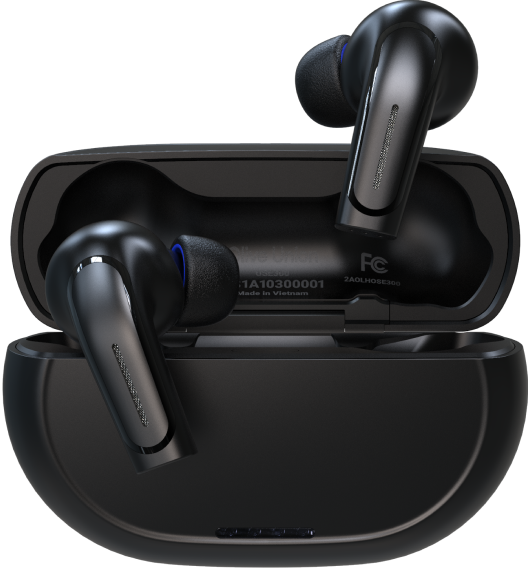
Both hearing aids and personal sound amplification products (PSAPs) can enhance our ability to hear sounds. They’re both wearable devices, usually with a component that sits inside the ear canal and a second component that sits behind the ear. They both share similar technology and have the function of amplifying sounds from the environment, such as speech. So what’s the difference?
What’s The Difference Between a Hearing Aid and a PSAP?
In March of 2009, in order to avoid confusion and incorrect usage of hearing aids and PSAPs, the Food and Drug Administration (FDA) issued guidance that explicitly states the difference between hearing aids and PSAPs.
According to the FDA guidelines, hearing aids are devices that amplify sound and are intended to offset impaired hearing. PSAPs, on the other hand, are not intended to offset any hearing impairment. They are intended for occasional and recreational use and only for consumers who do not experience any hearing impairment. They are intended to amplify sounds in the environment for multiple reasons, one of which is not hearing impairment.
What all of this means is that the major difference between hearing aids and PSAPs is that hearing aids are medical devices that are professionally fitted and tuned to the specific wearer. They help offset hearing loss by boosting specific frequencies where the user has a hearing loss deficiency.
PSAPs, on the other hand, amplify all sounds, regardless of frequency. Companies that produce hearing aids must put their products through rigorous testing in order for them to be approved by the FDA; PSAPs are not regulated in such a way because they are not medical devices and are not meant to be used by people experiencing hearing loss.
PSAPs come in a variety of styles and shapes, and with a range of features: they may be devices that simply amplify sound, or they may be more sophisticated devices that include directionality, compression, and Bluetooth technology to enable interfacing with a smartphone, answering calls, and streaming audio from a number of devices. They are sold over the counter and require none of the fitting, tests, or maintenance performed by an audiologist, making them much cheaper in comparison.
What's The Difference in Performance?
PSAPs should not be considered replacements for hearing aids. Hearing aids are much more sophisticated devices which are fitted and adjusted by a licensed audiologist to bring you the best fit and performance for your specific hearing impairment.
However, manufacturers of PSAPs may be catching up to hearing aids in terms functionality. Recent studies suggest that there isn’t much difference between hearing aids and PSAPs when it comes to performance and preference. In fact, people experiencing mild to moderate sensorineural hearing loss were better able to understand speech in a quiet environment with PSAPs compared to hearing aids; this suggests that PSAPs may be a good alternative to hearing aids for people experiencing mild to moderate hearing loss. This increased performance did not extend to environments with background noise, however.
In another study, PSAPs and hearing aids performed similarly for people with mild to moderate hearing loss, and 50% of participants preferred PSAPs to hearing aids. Only for people with moderately severe hearing loss did premium hearing aids outperform PSAPs.
So Which One is Right For Me? A Hearing Aid Or a PSAP?
If you’re trying to decide between a hearing aid or a PSAP, then you may have hearing issues that need to be addressed by a professional. The National Institute on Deafness and Other Communication Disorders (NIDCD) has a 10-question online questionnaire that you can use to determine if you actually need a hearing test, but in general, you may have hearing loss if you answer yes to any of the following questions:
- Do people complain that you are shouting when you talk to them?
- Do you need the TV or radio turned up louder than other people in the room do?
- Do you find yourself asking people to repeat themselves?
- Can you hear out of one ear better than the other?
- Do you find yourself physically straining to hear?
- Is it difficult for you to hear a dripping faucet or a high violin note?
There is the potential to further damage your hearing if you choose to use a PSAP as a substitute for a hearing aid, and it may cause a delay in the diagnosis of what may be a hearing condition that can be treated. So, if you’re in doubt, find a hearing professional. The Hearing Loss Association of America maintains a “Find a Professional” webpage to help you find a hearing health professional. Alternatively, make an appointment with your physician. You may have wax build-up or a tumor that can be removed. If they determine that you have hearing loss, they will refer you to a licensed audiologist to have your hearing assessed.
The information in this guide has been written using the following reliable sources:
https://www.nidcd.nih.gov/health/do-you-need-hearing-test
https://www.hearingloss.org/hearing-help/find-a-professional/
https://www.aarp.org/health/conditions-treatments/info-2018/hearing-tests-treatments-fd.html
https://www.aarp.org/health/conditions-treatments/info-2015/hearing-amplifiers-psaps.html
https://www.ncbi.nlm.nih.gov/pmc/articles/PMC7141988/
https://jamanetwork.com/journals/jamaotolaryngology/fullarticle/2733788
 (708) 847-3208
(708) 847-3208










